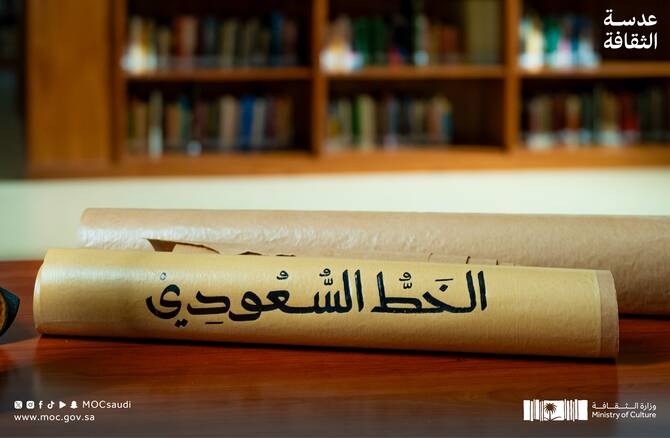RIYADH: Arabic calligraphy occupies a global artistic status that captivates Arabic speakers and non-speakers alike, enthusiasts have told Arab News.
The Ministry of Culture last week introduced two fonts based on Arabic calligraphy that are intended to be used by individuals and organizations in formal settings and for artistic works: Al-Awwal and Saudi.
Abdulrahman Al-Shahed, a founding member of the Saudi Arabic Calligraphy Association, told Arab News that the introduction of the fonts was “a welcome step that contributes to renewing the presence of Arabic calligraphy in digital and contemporary contexts, without separating it from its spiritual and aesthetic roots.”
He described the introduction of the fonts as “a call to rediscover calligraphy as a living identity.”
Arabic calligraphy “amazes viewers with its abstract beauty and contemplative spirit,” Al-Shahed said.
He noted that “many non-Arabs don’t read the letters, but they feel them and their beauty,” adding that Arabic calligraphy was consequently a universal visual language.
It has been evolving for more than 1,400 years, and each generation adds its own influence to the artform, expressing its own spirit and time, he said.
Abdul Adeem Al-Shali, a member of the Fine Arts Group in Qatif, told Arab News that “there is a growing interest among a large segment of non-Arabic speakers in the Arabic language and its letters and words.”
He added: “This interest demonstrates the magic of the Arabic letter and its appeal to the eye of the average recipient, let alone someone with artistic awareness.”
Many foreigners have masterfully drawn calligraphy. The American calligrapher Mohamed Zakariya, who converted to Islam and learned calligraphy in Istanbul, gained widespread fame, for example.
He held numerous calligraphy exhibitions in America and other Western countries, receiving praise from those interested in the art, said Al-Shali.
The arts enthusiast is optimistic about the future of Arabic calligraphy and urged those in charge of art colleges, calligraphy institutes, and Arabic language colleges at universities to “preserve this great heritage and teach it to current generations with great care.”
Prince Badr bin Abdullah bin Farhan, the minister of culture, said that the new typefaces were a tribute to the Kingdom’s rich cultural and artistic heritage, his ministry adding that they were based on historic “inscriptions and Qur’anic manuscripts.”
The design of Al-Awwal highlights the spirit of calligraphy in ancient inscriptions in the Arabian Peninsula.
The Saudi takes into account the artistic principles of the Al-Awwal script and makes it more contemporary.
A group of local and international experts was responsible for their design, with support from the Saudi Authority for Intellectual Property, the King Abdulaziz Foundation for Research and Archives, and the Prince Mohammed bin Salman Global Center for Arabic Calligraphy Initiative.
Arabic calligraphy originated in the Arabian Peninsula and was influenced by the cultural and political conditions in the region and ancient rock art from pre-Islamic civilizations and languages. It spread with the migration of Arabs during the Islamic expansion.
The new typefaces “reflect the historical depth of the Kingdom of Saudi Arabia, which is considered the cradle of ancient human civilizations and the home of various calligraphy and inscriptions, ranging from Musnad, Nabataean, and Thamudic,” the Ministry of Culture said, referencing some of the ancient civilizations from the peninsula.
















